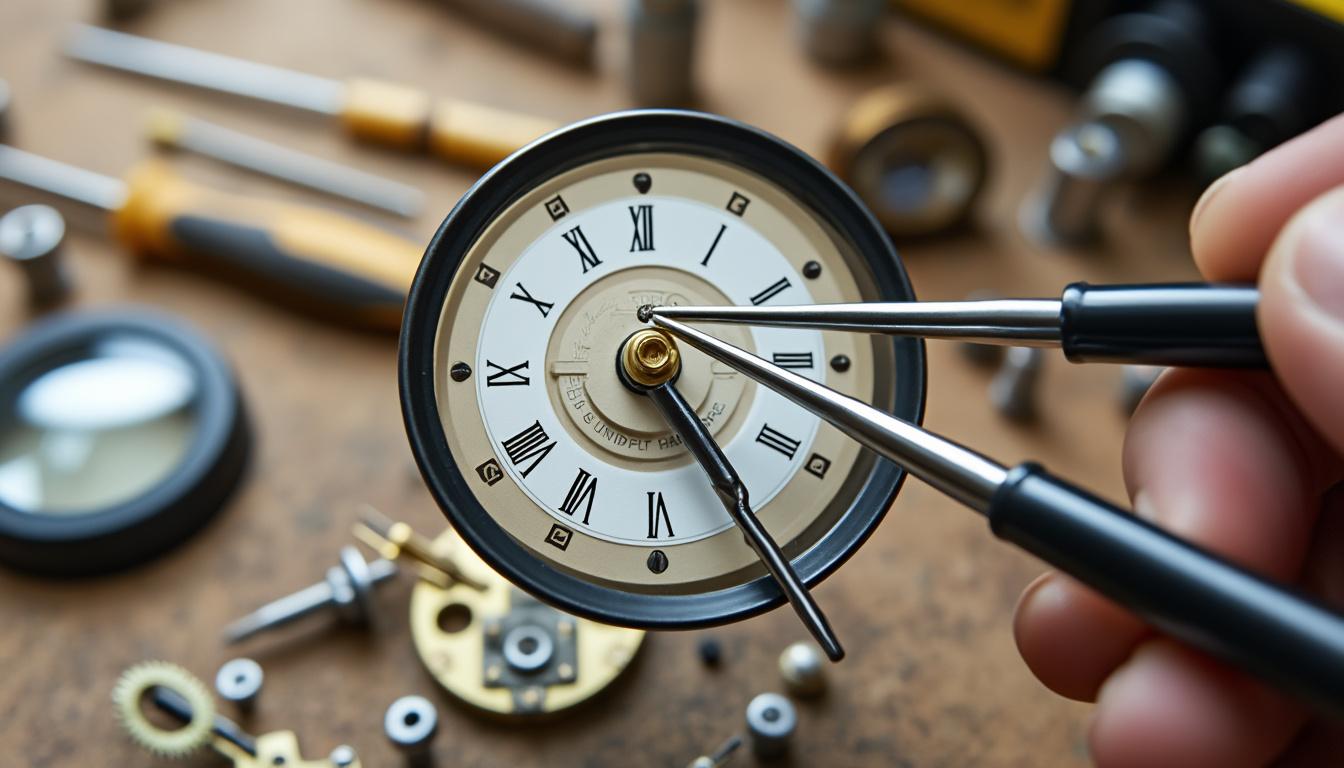Wall clocks add a classic charm to Canadian homes, reflecting both style and functionality. When one of those iconic hands—whether from brands like Howard Miller or Seiko—gets bent, it can throw the entire mechanism off balance, causing inaccurate timekeeping or even halting your clock altogether. Fixing a bent hand isn’t rocket science, but it does require some care and the right approach to avoid damage. With busy lifestyles from bustling Toronto lofts to cozy Vancouver condos, Canadians want quick fixes that don’t compromise on quality or aesthetics. We’ll walk through how to identify what’s wrong with your wall clock’s hand, the right tools you’ll want at the ready, and precise ways to straighten and realign your clock hands, whether they’re from a trusted Timex, Bulova, or Citizen model. 🕰️
Many clocks in Canada, from Pulsar wall clocks in Calgary homes to elegant Breguet or Chopard pieces in Montreal, share similar construction principles. Knowing which part is bent and how to handle it will save you a trip to an expensive local repair shop. Plus, you’ll learn how to maintain your clock’s hands to ensure they last for years.

Understanding Your Wall Clock’s Hands and Their Components
Before diving into repair, it’s key to grasp the basic anatomy of your wall clock’s hands. While the intricate mechanics inside brands like Casio or Rolex might be sophisticated, the visible components share common features:
- 🕒 Dial: The clock’s face, with numerals or markers.
- ⏰ Hour Hand: The shorter, thicker hand showing the hour.
- ⏲️ Minute Hand: The longer hand tracking minutes.
- 🕑 Second Hand: Present in some clocks; it sweeps or ticks every second.
- ⚙️ Hand Shaft: The central axis holding all the hands.
- 🔩 Mounting Nut: The tiny nut that fastens the hands on the shaft.
Imagine your wall clock is a smaller, more delicate piece than you’d think. A bent minute hand rubbing against the dial or another hand can completely stop time from moving forward. Recognition of these parts is crucial, especially if your Howard Miller or Seiko clock starts losing minutes. Remember, precious Canadian vintages or even modern Pulsar wall clocks depend on these simple yet essential components to keep accurate time.
| Component 🔧 | Function 🔍 | Example – Typical Brand ⚙️ |
|---|---|---|
| Hour Hand | Shows the hour | Bulova wall clocks |
| Minute Hand | Shows minutes | Citizen clock models |
| Second Hand | Shows seconds on some clocks | Timex and Casio |
| Hand Shaft | Axis where hands are fitted | Rolex wall clocks (luxury) |
| Mounting Nut | Secures hands to shaft | Chopard clocks |
Essential Tools Canadian DIYers Need to Straighten a Bent Clock Hand
When you are dealing with a clock hand that’s bent or misaligned, having the right tools is half the battle won. Whether your reliable Timex or classic Howard Miller wall clock needs a fix in the comfort of your Toronto or Montreal home, here’s what you’ll want close by:
- 🔧 Screwdrivers: Flathead or Phillips, depending on clock screws.
- 👈 Tweezers: Precision tweezers are perfect for handling small clock hands delicately.
- ⛏ Needle-nose pliers: Helpful for gentle bending and adjustments.
- 🧤 Soft cloth or microfiber: To protect hands and dial from scratches.
- 📏 Ruler or measuring tool: For checking hand alignment and spacing.
- 🔍 Magnifying glass: Handy for tiny adjustments, especially on detailed clocks like Breguet or Rolex.
Each of these tools is readily available at Canadian hardware stores such as Home Depot Canada, Canadian Tire, or specialized clock repair shops in cities like Vancouver or Calgary. Investing a few dollars for soft cloths or tweezers prevents accidental damage and keeps your clock looking crisp after the repair. Avoid harsh tools or makeshift items—it’s all about finesse here!
| Tool 🛠️ | Use 🎯 | Brand or Location Example 🇨🇦 |
|---|---|---|
| Screwdriver | Removing mounting nuts or screws | Canadian Tire toolkit section |
| Tweezers | Holding and adjusting small hands | Home hardware shop, Vancouver |
| Needle-nose pliers | Bending hands gently | Available at RONA |
| Soft cloth | Protecting surfaces from scratches | Local dollar stores, Toronto |
| Magnifying glass | Tiny detail work | London Drugs, Edmonton |
How to Remove Bent Hands on Your Wall Clock Safely
Removing a bent hand is necessary to straighten or replace it. Here’s a step-by-step guide tailored for Canadian DIYers aiming to save repair costs and time:
- ⏹️ Stop the clock: Remove the battery if it’s quartz or stop the mechanical pendulum.
- 🔍 Locate the mounting nut: Usually at the centre on the clock face, holding hands onto the shaft.
- 🔧 Using proper screwdrivers, gently unscrew and remove the mounting nut. Have a small container ready to keep it safe.
- ✋ Carefully pull the hour hand upward close to its base, avoiding bending.
- ✋ Repeat with minute hand: Apply slow, steady pressure to avoid damage.
- 🖐️ If present, remove the second hand similarly. It can be more delicate.
It helps to perform this procedure on a flat, clean surface and good lighting, typical in Canadian homes with plenty of north-facing window light. Precision and patience are your best allies when dealing with prized clocks by brands like Bulova or Citizen. Avoid the temptation to force the hands off—slow and steady wins here.
| Step ⚙️ | Action 🛠️ | Tip for Canadian Users 🍁 |
|---|---|---|
| 1 | Stop clock | In winter, check for frost near clock to avoid sudden breaks |
| 2 | Find mounting nut | Use daylight for clearer visibility |
| 3 | Remove mounting nut carefully | Place nut in small container, ideally a repurposed maple syrup cap |
| 4 | Gently pull hour hand | Wear cotton gloves to prevent fingerprints |
| 5 | Repeat for minute hand | Use tweezers for better grip if necessary |
Step-by-Step Guide to Straighten and Reinstall Clock Hands Without Damage
Once you’ve removed the bent hand, it’s time to fix it and put everything back in place. Here’s how you can do it, especially for those who appreciate fine craftsmanship from Seiko, Timex, or Chopard clocks:
- 🛠 Inspect the bent hand: Identify the precise bend location. Avoid bending multiple times as metal fatigue could lead to breakage.
- 🔎 Use needle-nose pliers or tweezers gently to straighten. Hold the hand firmly and slowly apply little pressure to bring it back in line.
- 📐 Check the hand against a straight edge or ruler; ensure it’s no longer touching the clock face or other hands when reinstalled.
- 🔩 Reinstall the hour hand first: place it back onto the hand shaft aligned exactly where it was.
- 🕰 Install the minute hand next: be very careful it doesn’t touch the hour hand or rubbing the dial.
- 🔧 Replace the mounting nut: snug it firmly but don’t overtighten to avoid damaging delicate clock internal parts.
- 🧹 Test the movement: gently spin hands to ensure smooth motion.
- ⏲️ Replace batteries: start the clock and confirm timekeeping accuracy.
Try to avoid any sharp angles or sudden bends during your fixing process. Some Canadian enthusiasts opt for professional assistance for valuable Rolex or Breguet wall clocks, but for everyday Timex or Citizen clocks, this DIY approach works well.
| Step 🛠️ | Description 🔧 | Useful Tip for Canadian Users 🍁 |
|---|---|---|
| 1 | Inspect bent area | Good lighting near window or LED lamp |
| 2 | Straighten gently | Slow movements prevent metal fatigue |
| 3 | Check straightness with ruler | Compare to a known straight edge, like a hockey stick shaft |
| 4 | Reinstall hands carefully | Gloves help keep hands clean |
| 5 | Secure mounting nut | Don’t overtighten to keep mechanism safe |
Troubleshooting and Maintenance Tips to Keep Your Wall Clock Hands in Top Shape for Years
Even after a successful fix, clock hands can sometimes act up again, especially with Canadian temperature swings from cold winters to hot summers. Here’s how to address common issues and maintain your clock hands:
- ❄️ Watch for stuck hands: Obstructions from dust or warped hands are common. Regular dusting using a soft cloth keeps things moving smoothly.
- 🛠 Fixing loose hands: Check the mounting nut. Tightening slightly usually solves wobbling hands but beware of overtightening.
- 🔧 Oiling mechanism: Use clock-specific oil sparingly on the hand shaft to prevent squeaks and sticky movement.
- 📅 Seasonal checks: Clocks may expand with humidity or contract in dryness. Give them a quick once-over twice a year, especially if located near humid kitchens or heated rooms.
- 🏆 Consider pro help for heirlooms: High-end pieces from brands like Breguet and Rolex often benefit from professionals who can provide meticulous cleaning and repairs.
Maintaining your wall clock proactively keeps its hands moving gracefully and your home stylishly punctual.
| Issue ⚠️ | Cause 🔍 | Solution 🛠️ |
|---|---|---|
| Hand stuck against dial | Bent or misaligned hand | Straighten hand and ensure clearance |
| Loose hands | Loose mounting nut | Tighten nut carefully |
| Sticky movement | Lack of lubrication | Apply clock oil sparingly |
| Hands touching each other | Misaligned placement | Adjust hands with tweezers or pliers |
Frequently Asked Questions About Straightening Bent Clock Hands
-
Can I fix bent clock hands myself?
Yes, with care and the right tools, many Canadians successfully fix bent hands at home.
-
What if the hands still don’t move after straightening?
Check for underlying mechanical issues or obstructions; consider consulting a clock repair professional.
-
Do batteries affect hand movement?
Weak batteries can cause sluggish or stopped hands, so always ensure fresh batteries.
-
Is it okay to overtighten the mounting nut?
No, overtightening can damage the movement or warp the hands.
-
Where can I buy replacement hands in Canada?
Stores like Lee Valley Tools, specialty clock shops in Montreal, or online retailers often stock compatible parts for popular brands.



